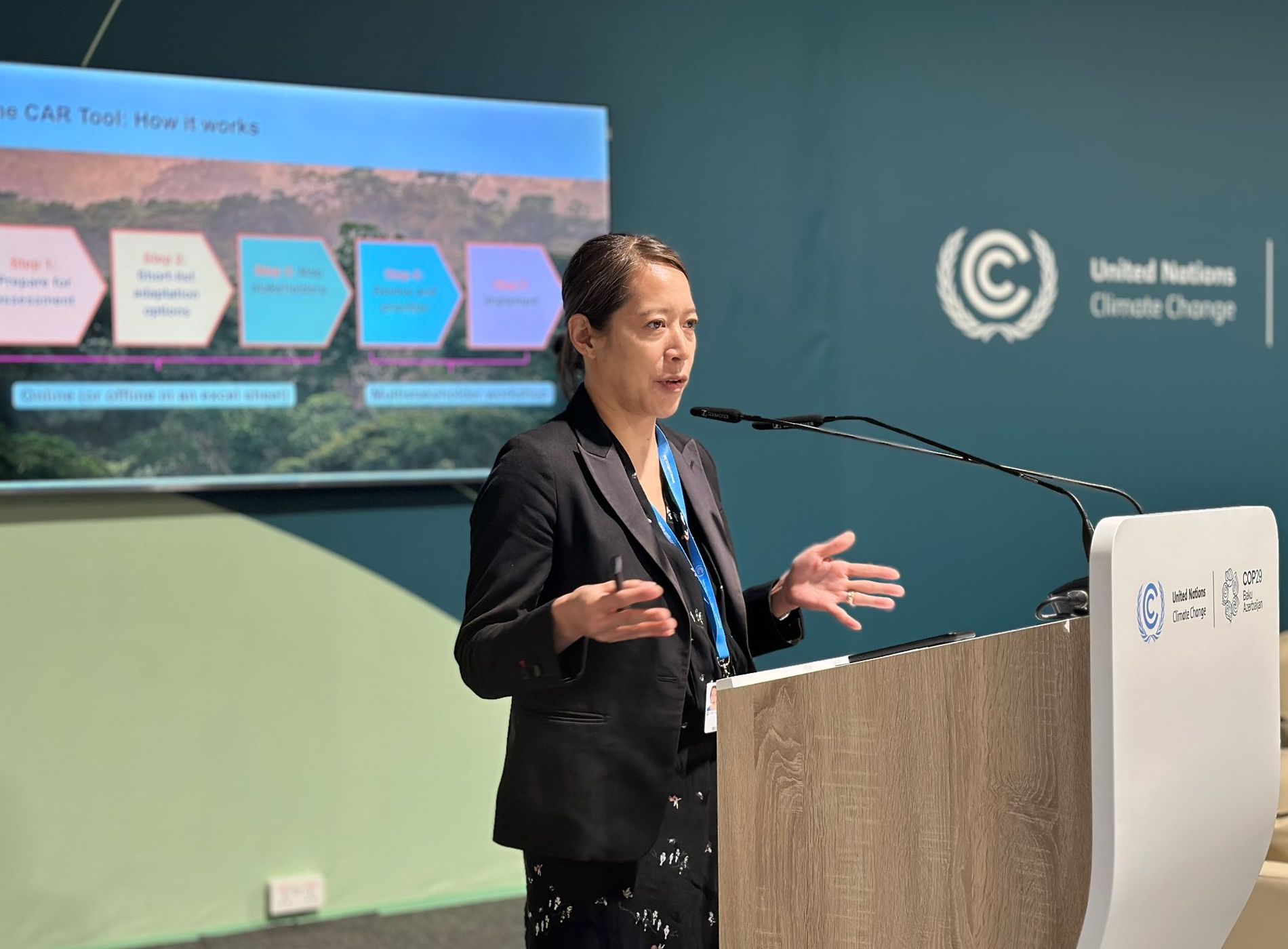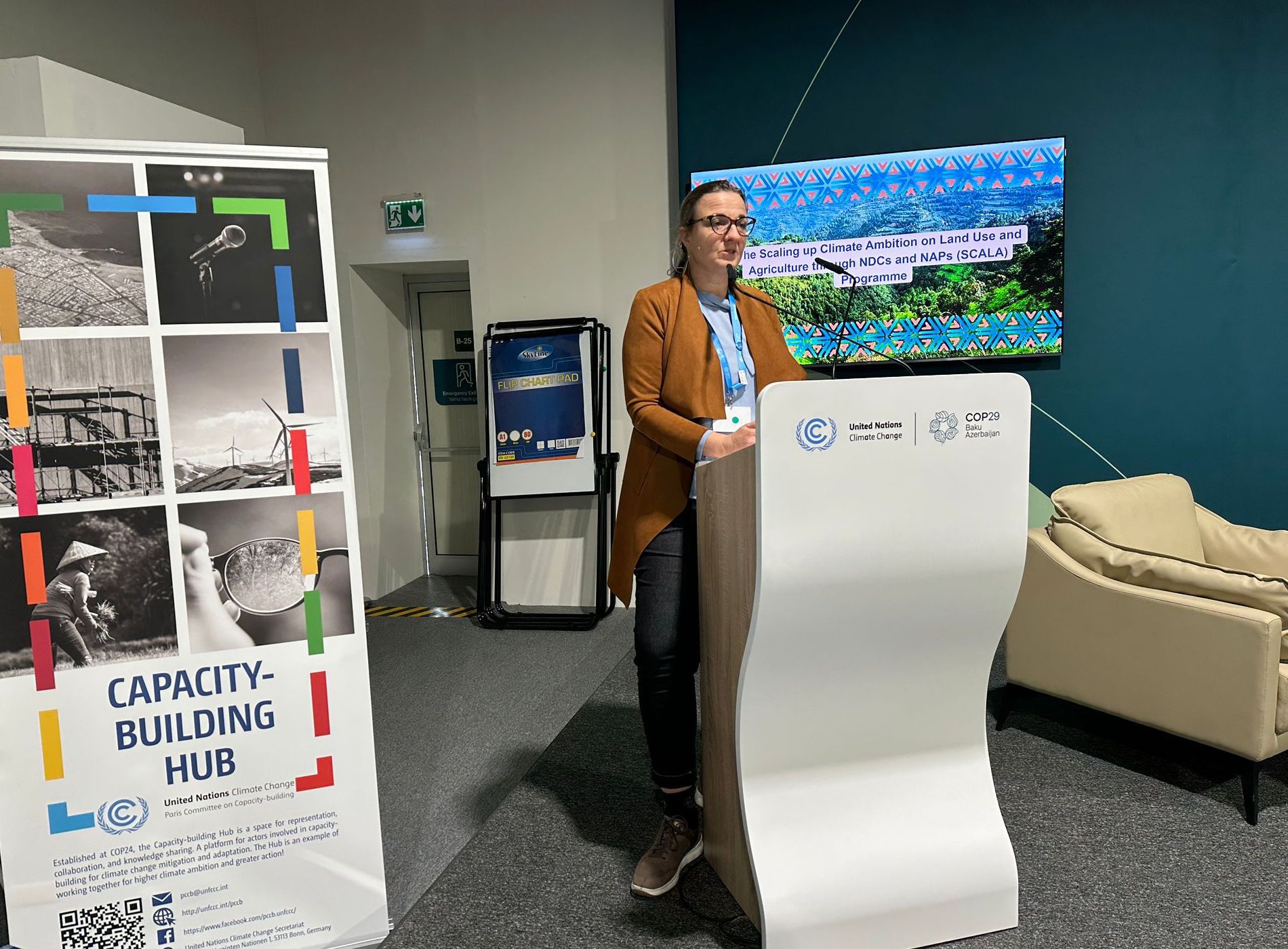
Just days after a EUR 6 million three-year extension was confirmed for the SCALA programme by Germany’s Ministry for the Environment (BMUV) through the International Climate Initiative (IKI), programme leads UNDP and FAO had more positive news to spread at COP29 with the launch of a new tool that supports the implementation of tailored climate interventions in agrifood value chains.
The Climate Action Review (CAR) Tool helps countries decide on high-level climate priorities for the agriculture sector outlined in their nationally determined contributions (NDCs) and national adaptation plans (NAPs), assess their transformative potential, and develop long-lasting and targeted climate solutions through an inclusive approach.
NDCs are the primary nationally driven instrument for achieving the goals of the Paris Agreement on climate change. NAPs were developed under the Cancun Adaptation Framework to identify medium- and long-term climate change adaptation needs and develop and implement strategies and programmes to address those needs.
Capacity-building as a key feature of the SCALA programme
The official version of the CAR Tool debuted at a side event at the UN Framework Convention on Climate Change’s 6th Capacity-building Hub during the Capacity-building Tools and Methodologies Marketplace Day, for which FAO was lead partner. It incorporates significant improvements based on extensive user feedback of an earlier version successfully piloted in ten SCALA countries in Africa, Asia and Latin America.
Explaining the context of the CAR Tool’s development, Julia Wolf, Global Coordinator of SCALA, FAO, underlined how the SCALA programme had identified national climate plans – particularly NDCs and NAPs – as key entry points for bringing about transformative climate action and achieving the goals of the Paris Agreement.
However, Ms. Wolf noted, “often what’s missing in countries is the bridge linking well-intentioned national policies with ground-level action and innovative financing solutions”. She said SCALA sought to address this with the CAR Tool, which encourages widespread consultation among all actors involved in implementation to unpack the priority areas identified by countries themselves. Users of the CAR Tool ensure inclusivity in climate action by involving different ministries – including agriculture, environment, finance, planning, infrastructure – and key stakeholders such as community and farmers’ groups, the private sector, and development finance.
“One of the hot topics at this COP is climate finance – we know only 4.3 percent goes to agriculture, and just a fraction of that goes to small-scale farmers. So, we need investment-ready agrifood solutions that can quickly enhance climate resilience in rural communities. The CAR Tool is a great way of building capacity to identify and apply these solutions – through a whole-of-society approach it helps countries rank the measures with most potential to be scaled up in the value chains and localities that they see as a priority.”
 |  |
CAR Tool demo, with experience from Mongolia and Colombia
Ms. Julie Teng, Global Coordinator of SCALA, UNDP, gave an active demonstration of the five steps that countries can use in the CAR Tool: i) preparing for assessment; ii) short-listing adaptation priorities from NDCs and NAPs for evaluation; iii) mapping stakeholders for consultation; iv) assessing the transformative potential of adaptation priorities; and v) developing an actionable roadmap for implementing transformative climate actions in the agriculture and land-use sectors. To make the demonstration even more concrete, Ms. Teng was able to draw on the perspectives of representatives from two SCALA countries that had piloted the tool: Tsogzolmaa Nanjaa, from the Ministry of Environment and Climate Change, Mongolia; and Her Excellency Chan Phaloeun, Under Secretary of State, Ministry of Agriculture, Forestry and Fisheries, Cambodia.
Ms. Nanjaa gave a breakdown of Mongolia’s priority adaptation actions (identified at step iv of the tool), which included assessment on livestock numbers and land degradation, agroforestry measures, optimizing meat production, use of genetic resources and pasture management, and use of drip irrigation for vegetable production.
H.E. Phaloeun highlighted how the CAR Tool had helped Cambodia identify where to develop capacity to implement priority climate actions. Examples she referenced included preparing assessments on value chains and crops; and creating stronger alignment and engagement with private sector and development finance institutions to help encourage greater climate investments in agrifood solutions.
There then followed a lively discussion with delegates from the floor touching on issues such as how the CAR Tool supports alignment with other sectors beyond agriculture and how countries are using the CAR Tool to develop policies and actions that can attract private sector investment (e.g. carbon credits related to afforestation projects in Cambodia or certified beef schemes in Costa Rica).
Other updates from SCALA partners
The CAR Tool is part of FAO’s toolbox for supporting developing countries on NDC implementation. The tool is already being promoted by partners through the NDC-Partnership Climate Box and will be part of the next revision of the multi-partner toolkit for national action on climate, biodiversity and water in agriculture and food security.
At COP 29, FAO also launched the key findings of a new global analysis – supported by SCALA – of agrifood systems in NDCs. The global analysis highlights the tremendous potential of agrifood systems as climate solutions, especially as countries prepare to submit their third round of NDCs in 2025. It reaffirms that, to deliver the Paris Agreement, agrifood solutions must be to the fore. A separate SCALA-led global analysis on agrifood systems in national adaptation plans is scheduled for publication in 2025.
Meanwhile, the UNDP Climate Promise continues to play a pivotal role in supporting countries as they achieve the enhanced ambitions of NDC 3.0 in 2025. Focusing on integrating adaptation strategies into agriculture and land-use sectors through tools like the Climate Action Review Tool ensures that transformative adaptation actions are systematically embedded into national and local policies.
As part of its second phase (2022–2026) and the largest climate portfolio in the UN system, the UNDP Climate Promise has scaled its impact to over 140 countries. The SCALA programme, as a key contributor, focuses on enhancing climate-resilient practices in agriculture and land use, complementing broader UNDP efforts to support countries in aligning their policies with their national adaptation plans and NDC goals. This expansive support continues to provide a framework for accelerating resilience and sustainable development pathways.
The CAR Tool is now freely available for all countries to use.
Find out more at the following links:
